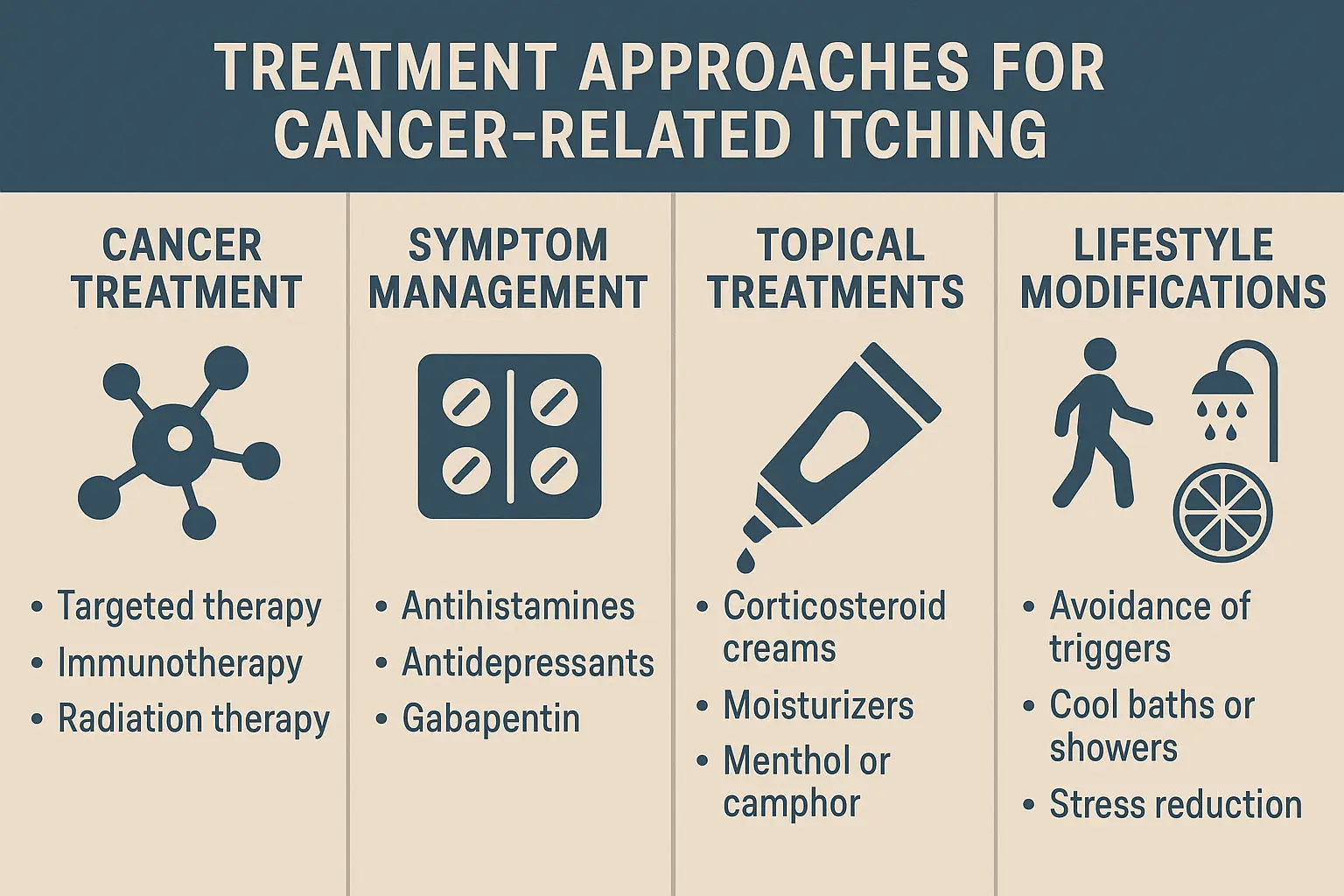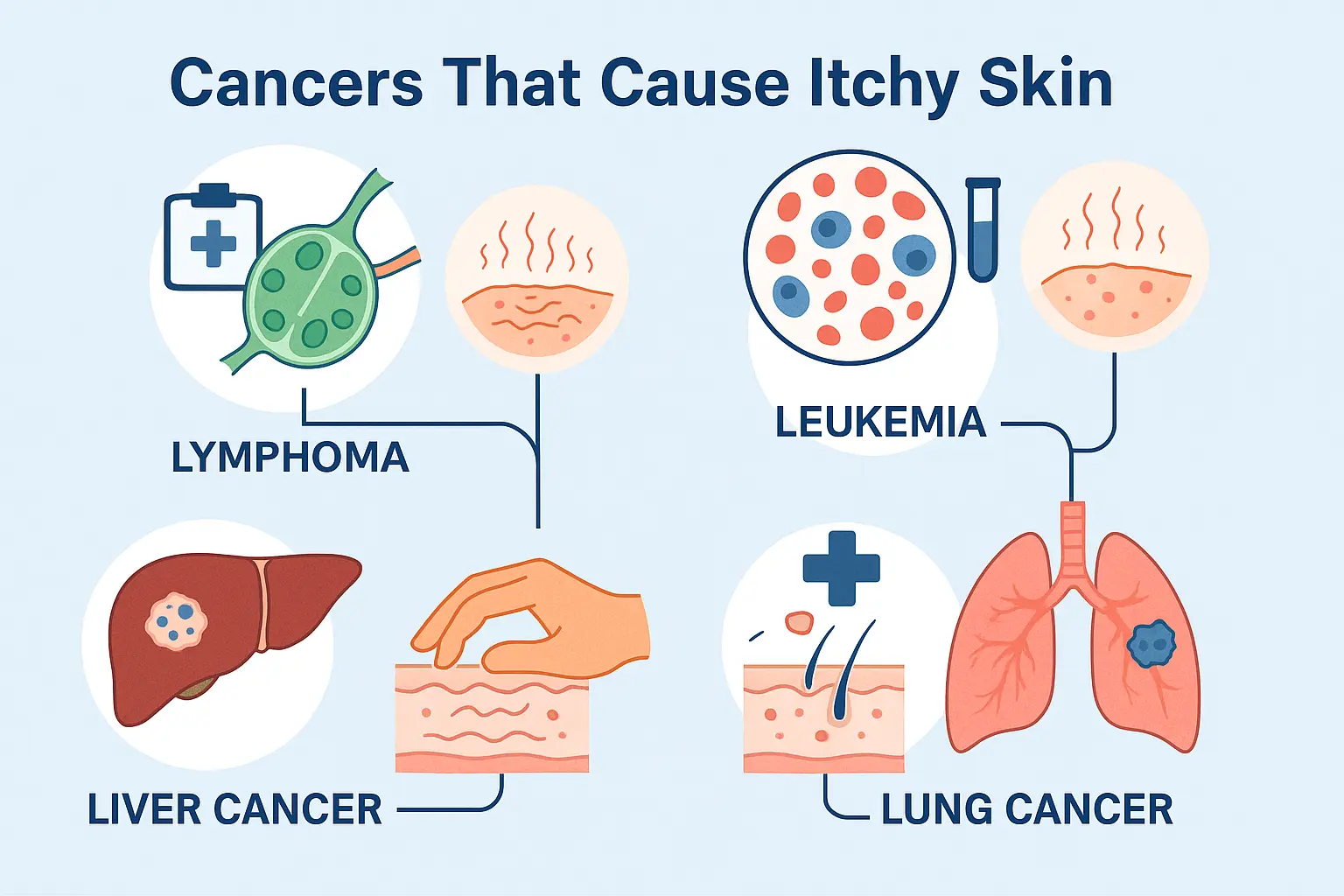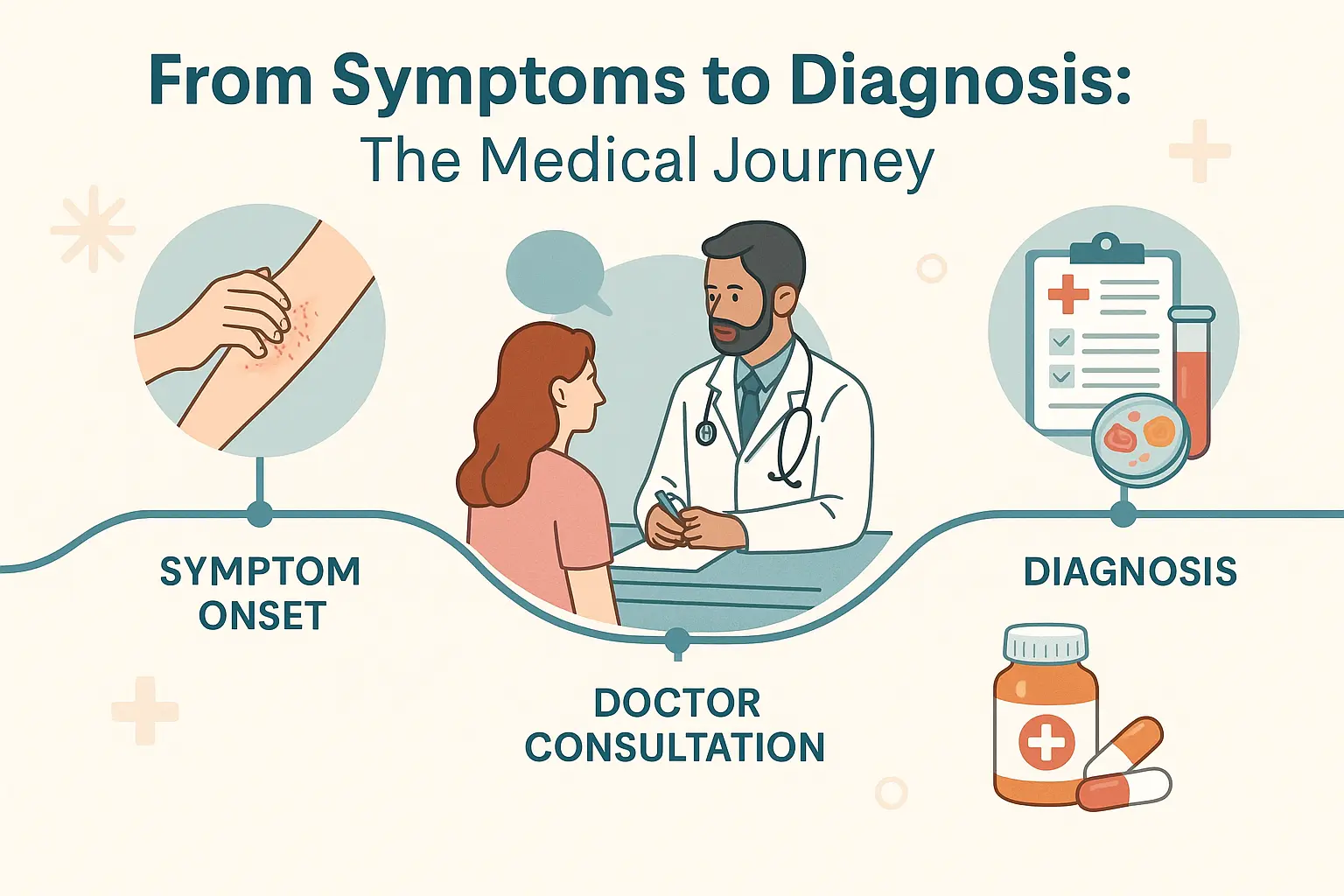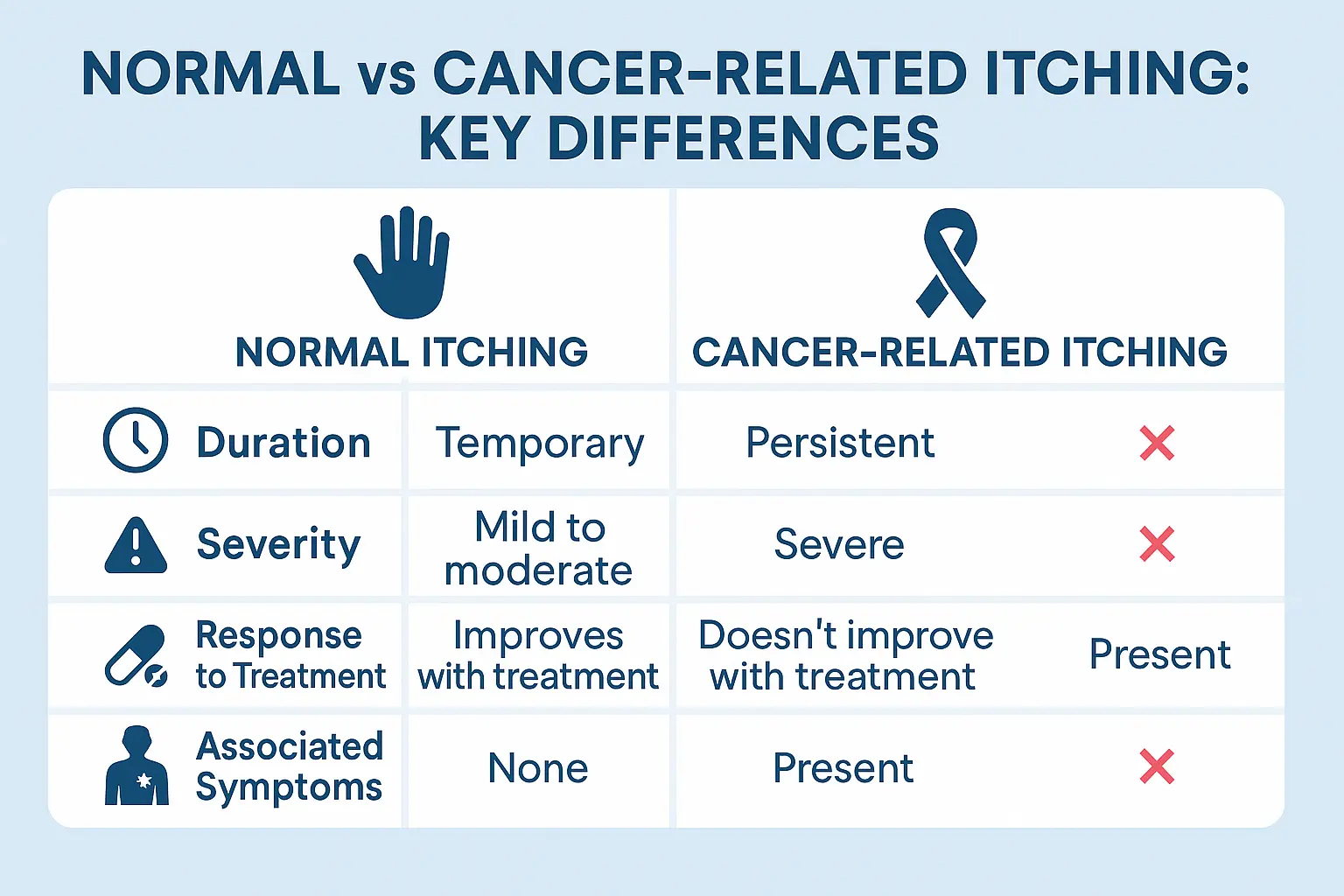When your skin starts itching persistently without an obvious cause, you might wonder if it's just dry weather or something more serious. While most itchy skin comes from common conditions like eczema or allergies, sometimes this annoying symptom can signal something unexpected: cancer. Understanding what cancer can cause itchy skin could be the key to early detection and better health outcomes.

• Multiple cancer types can cause itchy skin, including blood cancers like lymphoma and leukemia, as well as solid tumors
• Persistent, unexplained itching that doesn't respond to typical treatments may warrant medical evaluation
• Early detection matters - recognizing when itching might be cancer-related can lead to timely diagnosis and treatment
• Associated symptoms like night sweats, weight loss, or swollen lymph nodes alongside itching are particularly concerning
• Professional evaluation is essential when dealing with chronic, unexplained skin itching
The relationship between cancer and itchy skin isn't always straightforward. When people ask what cancer can cause itchy skin, they're often surprised to learn that several different types can trigger this symptom through various mechanisms.
Cancer-related itching, medically known as pruritus, can occur for several reasons:
The body's response to cancer can trigger itching through multiple pathways. Cancer cells may release cytokines - inflammatory substances that irritate nerve endings in the skin. Additionally, some cancers affect the body's ability to process certain chemicals, leading to their accumulation and subsequent skin irritation.
Blood cancers are among the most common types associated with skin itching. These cancers affect the blood, bone marrow, or lymphatic system, often causing systemic symptoms including persistent itching.
Lymphoma is perhaps the most well-known cancer type when discussing what cancer can cause itchy skin. This cancer affects the lymphatic system and frequently presents with intense, persistent itching.
Hodgkin lymphoma causes itching in approximately 30% of patients. The itching is often:
Non-Hodgkin lymphoma can also cause significant itching, though it's somewhat less common than in Hodgkin lymphoma. The itching may be:
Leukemia, a cancer of blood-forming tissues, can cause itching through several mechanisms:
Certain types of leukemia are more likely to cause skin symptoms:
Leukemia TypeSkin InvolvementItching FrequencyAcute LymphoblasticModerate15-25%Acute MyeloidLow-Moderate10-20%Chronic LymphocyticHigh20-30%Chronic MyeloidLow5-15%
This specific type of lymphoma directly affects the skin and is a prime example of what cancer can cause itchy skin. Cutaneous T-cell lymphoma (CTCL) often presents with:
The itching from CTCL can be so severe that it significantly impacts quality of life and sleep patterns.
While blood cancers are more commonly associated with itching, several solid tumors can also trigger this symptom.
Liver cancer and bile duct cancers can cause itching through a specific mechanism involving bile salts. When these cancers block bile ducts or impair liver function, bile salts accumulate in the bloodstream and deposit in the skin, causing intense itching.
Characteristics of liver cancer-related itching:
Pancreatic cancer can cause itching when it blocks the bile duct, leading to a backup of bile into the bloodstream. This type of itching often occurs alongside:
Some cases of lung cancer can trigger itching through:
Certain breast cancers and gynecological cancers may cause itching, particularly:

Understanding the characteristics that distinguish cancer-related itching from common causes is crucial for early detection.
When evaluating what cancer can cause itchy skin, healthcare providers look for specific warning signs:
🚩 Persistent itching lasting more than 6 weeks without improvement
🚩 Nighttime itching that disrupts sleep
🚩 Whole-body itching without visible skin changes
🚩 Itching that doesn't respond to standard treatments
🚩 Associated symptoms like fever, weight loss, or swollen lymph nodes
Cancer-related itching rarely occurs alone. Other symptoms that may accompany it include:
The location and pattern of itching can provide clues about potential cancer involvement:
Generalized itching (all over the body) is more concerning for:
Localized itching may suggest:
Knowing when to consult a healthcare provider about itchy skin is essential for early cancer detection. Professional medical evaluation should be sought when experiencing concerning symptoms.
Seek immediate medical care if experiencing:
Schedule a medical appointment for:
<!DOCTYPE html>
<html lang="en">
<head>
<meta charset="UTF-8">
<meta name="viewport" content="width=device-width, initial-scale=1.0">
<title>Cancer-Related Itching Assessment Tool</title>
<style>
.cg-element-container {
max-width: 800px;
margin: 20px auto;
padding: 20px;
font-family: Arial, sans-serif;
background: linear-gradient(135deg, #f5f7fa 0%, #c3cfe2 100%);
border-radius: 15px;
box-shadow: 0 10px 25px rgba(0,0,0,0.1);
}
.cg-element-header {
text-align: center;
color: #2c3e50;
margin-bottom: 25px;
font-size: 24px;
font-weight: bold;
}
.cg-element-question {
background: white;
margin: 15px 0;
padding: 20px;
border-radius: 10px;
box-shadow: 0 2px 10px rgba(0,0,0,0.05);
border-left: 4px solid #3498db;
}
.cg-element-question h3 {
margin: 0 0 15px 0;
color: #2c3e50;
font-size: 16px;
}
.cg-element-option {
margin: 8px 0;
display: flex;
align-items: center;
}
.cg-element-option input {
margin-right: 10px;
transform: scale(1.2);
}
.cg-element-option label {
cursor: pointer;
color: #34495e;
font-size: 14px;
}
.cg-element-button {
background: linear-gradient(135deg, #667eea 0%, #764ba2 100%);
color: white;
border: none;
padding: 15px 30px;
border-radius: 25px;
font-size: 16px;
font-weight: bold;
cursor: pointer;
display: block;
margin: 25px auto;
transition: transform 0.3s ease;
}
.cg-element-button:hover {
transform: translateY(-2px);
}
.cg-element-result {
margin-top: 25px;
padding: 20px;
border-radius: 10px;
text-align: center;
font-weight: bold;
display: none;
}
.cg-element-low-risk {
background: #d5f4e6;
color: #27ae60;
border: 2px solid #27ae60;
}
.cg-element-moderate-risk {
background: #fef9e7;
color: #f39c12;
border: 2px solid #f39c12;
}
.cg-element-high-risk {
background: #fadbd8;
color: #e74c3c;
border: 2px solid #e74c3c;
}
.cg-element-disclaimer {
margin-top: 20px;
padding: 15px;
background: #ecf0f1;
border-radius: 8px;
font-size: 12px;
color: #7f8c8d;
text-align: center;
}
@media (max-width: 600px) {
.cg-element-container {
margin: 10px;
padding: 15px;
}
.cg-element-header {
font-size: 20px;
}
.cg-element-question {
padding: 15px;
}
}
</style>
</head>
<body>
<div class="cg-element-container">
<div class="cg-element-header">
🔍 Cancer-Related Itching Assessment Tool
</div>
<form id="cg-element-assessment-form">
<div class="cg-element-question">
<h3>How long have you been experiencing persistent itching?</h3>
<div class="cg-element-option">
<input type="radio" id="duration1" name="duration" value="0">
<label for="duration1">Less than 2 weeks</label>
</div>
<div class="cg-element-option">
<input type="radio" id="duration2" name="duration" value="1">
<label for="duration2">2-6 weeks</label>
</div>
<div class="cg-element-option">
<input type="radio" id="duration3" name="duration" value="2">
<label for="duration3">More than 6 weeks</label>
</div>
</div>
<div class="cg-element-question">
<h3>Is the itching worse at night?</h3>
<div class="cg-element-option">
<input type="radio" id="night1" name="night" value="0">
<label for="night1">No difference</label>
</div>
<div class="cg-element-option">
<input type="radio" id="night2" name="night" value="1">
<label for="night2">Slightly worse at night</label>
</div>
<div class="cg-element-option">
<input type="radio" id="night3" name="night" value="2">
<label for="night3">Much worse at night, disrupts sleep</label>
</div>
</div>
<div class="cg-element-question">
<h3>Have you experienced unexplained weight loss (>10 lbs in 6 months)?</h3>
<div class="cg-element-option">
<input type="radio" id="weight1" name="weight" value="0">
<label for="weight1">No weight loss</label>
</div>
<div class="cg-element-option">
<input type="radio" id="weight2" name="weight" value="2">
<label for="weight2">Yes, significant unexplained weight loss</label>
</div>
</div>
<div class="cg-element-question">
<h3>Do you have swollen lymph nodes?</h3>
<div class="cg-element-option">
<input type="radio" id="nodes1" name="nodes" value="0">
<label for="nodes1">No swollen lymph nodes</label>
</div>
<div class="cg-element-option">
<input type="radio" id="nodes2" name="nodes" value="2">
<label for="nodes2">Yes, swollen lymph nodes in neck, armpits, or groin</label>
</div>
</div>
<div class="cg-element-question">
<h3>Are you experiencing night sweats?</h3>
<div class="cg-element-option">
<input type="radio" id="sweats1" name="sweats" value="0">
<label for="sweats1">No night sweats</label>
</div>
<div class="cg-element-option">
<input type="radio" id="sweats2" name="sweats" value="1">
<label for="sweats2">Occasional night sweats</label>
</div>
<div class="cg-element-option">
<input type="radio" id="sweats3" name="sweats" value="2">
<label for="sweats3">Frequent, drenching night sweats</label>
</div>
</div>
<div class="cg-element-question">
<h3>How does the itching respond to typical treatments (moisturizers, antihistamines)?</h3>
<div class="cg-element-option">
<input type="radio" id="response1" name="response" value="0">
<label for="response1">Responds well to treatments</label>
</div>
<div class="cg-element-option">
<input type="radio" id="response2" name="response" value="1">
<label for="response2">Partial response to treatments</label>
</div>
<div class="cg-element-option">
<input type="radio" id="response3" name="response" value="2">
<label for="response3">No response to typical treatments</label>
</div>
</div>
<button type="button" class="cg-element-button" onclick="calculateRisk()">
Assess My Risk Level
</button>
</form>
<div id="cg-element-result" class="cg-element-result"></div>
<div class="cg-element-disclaimer">
<strong>Important Disclaimer:</strong> This assessment tool is for educational purposes only and should not replace professional medical advice. If you have concerns about persistent itching or any symptoms, please consult with a healthcare provider for proper evaluation and diagnosis.
</div>
</div>
<script>
function calculateRisk() {
const form = document.getElementById('cg-element-assessment-form');
const formData = new FormData(form);
let totalScore = 0;
let answeredQuestions = 0;
// Check if all questions are answered
const requiredQuestions = ['duration', 'night', 'weight', 'nodes', 'sweats', 'response'];
for (let question of requiredQuestions) {
if (formData.get(question)) {
totalScore += parseInt(formData.get(question));
answeredQuestions++;
}
}
if (answeredQuestions < requiredQuestions.length) {
alert('Please answer all questions to get your risk assessment.');
return;
}
const resultDiv = document.getElementById('cg-element-result');
let riskLevel, message, className;
if (totalScore <= 3) {
riskLevel = 'Lower Risk';
className = 'cg-element-low-risk';
message = `
<h3>✅ ${riskLevel}</h3>
<p>Your symptoms suggest a lower likelihood of cancer-related itching. However, if symptoms persist or worsen, consider consulting a healthcare provider for proper evaluation.</p>
<p><strong>Recommendation:</strong> Monitor symptoms and maintain good skin care practices.</p>
`;
} else if (totalScore <= 6) {
riskLevel = 'Moderate Risk';
className = 'cg-element-moderate-risk';
message = `
<h3>⚠️ ${riskLevel}</h3>
<p>Your symptoms warrant medical evaluation. While many conditions can cause persistent itching, the combination of your symptoms suggests you should consult a healthcare provider.</p>
<p><strong>Recommendation:</strong> Schedule an appointment with your doctor within 1-2 weeks.</p>
`;
} else {
riskLevel = 'Higher Risk';
className = 'cg-element-high-risk';
message = `
<h3>🚨 ${riskLevel}</h3>
<p>Your combination of symptoms is concerning and requires prompt medical evaluation. These symptoms could indicate various serious conditions, including cancer.</p>
<p><strong>Recommendation:</strong> Contact your healthcare provider immediately or visit an urgent care facility.</p>
`;
}
resultDiv.className = `cg-element-result ${className}`;
resultDiv.innerHTML = message;
resultDiv.style.display = 'block';
// Smooth scroll to result
resultDiv.scrollIntoView({ behavior: 'smooth', block: 'center' });
}
</script>
</body>
</html>
When what cancer can cause itchy skin becomes a medical concern, healthcare providers follow a systematic approach to diagnosis.
The diagnostic process typically begins with:
Comprehensive Medical History
Physical Examination
Several blood tests can help identify potential cancer-related causes of itching:
Complete Blood Count (CBC)
Liver Function Tests
Inflammatory Markers
When initial tests suggest cancer involvement, more specialized testing may include:
Imaging Studies
Biopsy Procedures
Depending on symptoms and risk factors, specific cancer screenings may be recommended:
Managing itching caused by cancer requires addressing both the underlying cancer and the symptom itself.
The most effective long-term approach involves treating the cancer causing the itching:
Chemotherapy
Radiation Therapy
Immunotherapy
Targeted Therapy
While treating the underlying cancer, managing itching symptoms is crucial for quality of life:
Topical Treatments
Oral Medications
Advanced Therapies
Comprehensive care includes lifestyle modifications and supportive measures:
Skin Care Practices
Environmental Modifications
Stress Management

While not all cancers that cause itchy skin can be prevented, certain strategies may reduce risk:
Healthy Diet
Regular Exercise
Avoid Known Carcinogens
Staying current with recommended cancer screenings can enable early detection:
For comprehensive care and evaluation of concerning symptoms, consider consulting with experienced healthcare providers at specialized medical centers that focus on cancer detection and treatment.
Managing the daily challenges of cancer-related itching requires a comprehensive approach that addresses both physical and emotional aspects.
Sleep Management
Daily Activity Modifications
Emotional Support
Effective management of cancer-related itching often requires coordination among multiple healthcare providers:
Oncology Team
Dermatology Specialists
Primary Care Providers
For patients seeking comprehensive evaluation and treatment options, medical teams specializing in cancer care can provide coordinated, expert management.
The understanding of what cancer can cause itchy skin continues to evolve with ongoing research and new treatment developments.
Biomarker Development
New Treatment Modalities
Quality of Life Studies
Targeted Anti-Itch Medications
Precision Medicine Approaches
Integrative Medicine
Certain groups may have unique considerations when evaluating what cancer can cause itchy skin.
Older adults may face particular challenges:
While cancer-related itching is less common in children, it can occur:
People with compromised immune systems may experience:

Understanding what cancer can cause itchy skin empowers patients to advocate for appropriate care and access valuable resources.
Documenting Symptoms
Preparing for Medical Appointments
Seeking Second Opinions
National Organizations
Online Communities
Local Resources
For those seeking expert evaluation and comprehensive care, specialized medical facilities offer advanced diagnostic and treatment options for cancer-related symptoms.
Managing cancer-related itching can involve significant medical expenses, making financial planning important.
Understanding Benefits
Appealing Denials
Pharmaceutical Programs
Healthcare System Support
Budgeting Considerations
The ability to diagnose and treat cancer-related itching varies significantly worldwide, highlighting important access and equity issues.
Geographic Variations
Socioeconomic Factors
Technology Solutions
Community Outreach
For comprehensive information about available services and treatment options, patients can explore frequently asked questions and resources provided by specialized medical centers.
When dealing with cancer-related itching, family members and caregivers play crucial roles in supporting patient care and advocacy.
Symptom Monitoring
Emotional Support
Practical Assistance
Managing Caregiver Stress
Building Support Networks
Advances in technology are revolutionizing how we understand and treat what cancer can cause itchy skin.
Symptom Tracking Apps
Artificial Intelligence
Precision Medicine
Wearable Devices
Virtual Reality Therapy
Advanced Diagnostics
Understanding what cancer can cause itchy skin is crucial for early detection and effective treatment of various malignancies. While persistent, unexplained itching can be alarming, it's important to remember that many factors can cause this symptom, and not all cases are cancer-related.
The key takeaways for anyone experiencing concerning skin itching include:
Recognition is vital: Knowing the warning signs of cancer-related itching - including persistent duration, nighttime worsening, lack of response to typical treatments, and associated symptoms like weight loss or swollen lymph nodes - can prompt timely medical evaluation.
Multiple cancer types can be involved: Blood cancers like lymphoma and leukemia are most commonly associated with itching, but solid tumors affecting the liver, pancreas, lungs, and other organs can also trigger this symptom.
Professional evaluation matters: When itching persists for more than a few weeks or is accompanied by other concerning symptoms, seeking medical attention is essential. Healthcare providers can perform appropriate testing to determine the underlying cause and develop effective treatment plans.
Treatment approaches are multifaceted: Managing cancer-related itching involves treating the underlying cancer while simultaneously addressing the symptom itself through various medications, topical treatments, and supportive care measures.
Support systems are crucial: Living with cancer-related itching requires comprehensive support from healthcare teams, family, caregivers, and community resources. No one should face this challenge alone.
Research continues to advance: Ongoing studies are improving our understanding of cancer-related itching and developing new, more effective treatments that offer hope for better symptom management and quality of life.
If you're experiencing persistent, unexplained itching, don't ignore it. While it may be something simple and treatable, early evaluation can make a significant difference if cancer is involved. Trust your instincts, advocate for your health, and work closely with healthcare providers to get the answers and care you need.
For those seeking expert evaluation and comprehensive care, specialized medical centers offer the expertise and resources necessary to properly diagnose and manage complex symptoms like cancer-related itching.
Remember, knowledge is power when it comes to your health. Understanding the connection between cancer and itchy skin empowers you to take appropriate action and seek the care you deserve.